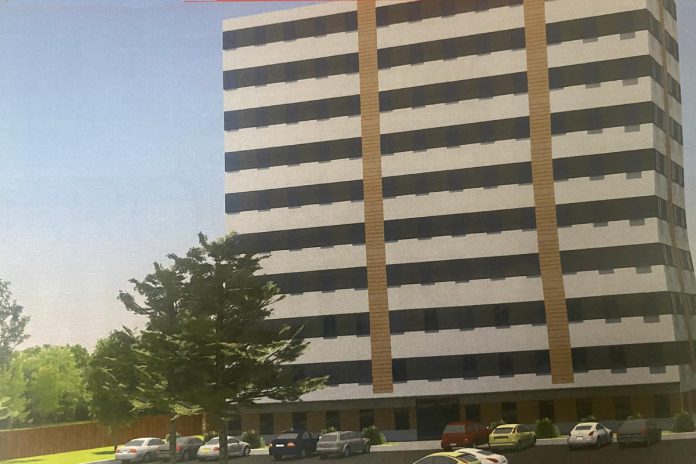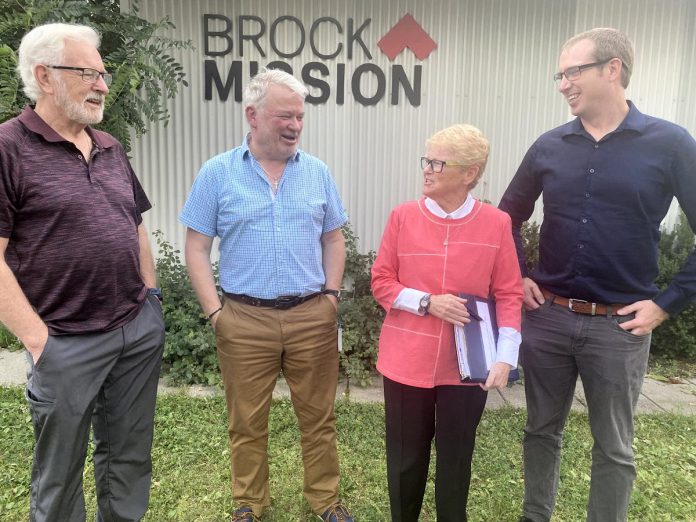
It’s big, it’s ambitious and, more to the point, it’s badly needed.
Brock Mission’s plan to build a 50-suite 10-storey building specifically designed “for men and women transitioning from homelessness to wellness” was unveiled Friday (August 30) at the Murray Street shelter.
While hard details of the project — such as the location, total cost, and completion date — haven’t been finalized at this point, the intent is crystal clear: the empowerment of those transitioning from homelessness by providing them with a supportive residential environment fully dedicated to the promotion of mental health, the facilitating of substance withdrawal, and the enhancing of social and employment skills.
The project has been approved by Brock Mission’s board of directors with the hope that it will be included on the agenda at September’s meeting of city council. A request to that effect has been submitted.
The board is asking city council to endorse the proposed project in principle, that it approve $250,000 in one-time funding for costs associated with the subsequent site approval process and securing of the required permits, and that any development and application fees be waived.
“We have designed the building (and) we know how it will be constructed,” said Brock Mission board member and project lead Alan Wilson. “We know what the layouts will be, we know what the materials (used) will be, we know what the rules will be.”
“We have had discussions with City Hall since September of last year. In January of this year, we made another presentation. I’ve been in contact with every (city) councillor and the mayor, and received amazing comments of support. Just this week, we got an email from the commissioner of social services (Sheldon Laidman) voicing his support for the project.”
“The only thing we need to do now is get on the (council meeting) agenda. We don’t want to be an agenda item that’s going to be cut during the budget process. We want to be an agenda item that talks about what we’re offering to do that nobody else is doing, except Brock Mission.”

What Brock Mission does, said Wilson, goes well beyond the provision of emergency shelter for men and — at affiliated Cameron House on Chemong Road — for women.
There are also professionally staffed support services and, at Brock Mission, a primary care clinic led by Major (Retired) Lee-Anne Quinn CD, NP that provides medical attention to anyone who is experiencing homelessness, not just shelter clients.
“We have 23 suites (at Brock Mission),” said Wilson, adding the new building “will add 50 to that.”
“This will be a permanent building running the way Brock (Mission) has for 37 years plus, helping people who are addicted, have mental health issues, and who are homeless. We want those folks off the streets.”
Brock Mission executive director Bill McNabb, who has been in that role for just more than 30 years, lives daily the work being done to help those who not only need it but want it — work that will continue on a grander scale at the new building.
“We’ve had the opportunity to see people stabilize and moving away from here (Brock Mission),” he said, noting over the past three months alone, 11 people have moved on from recovery to private housing.
“We call it semi-independent living. There are rules and bounds around them (clients). They are not tenants. They are part of a project where they create, with staff support, a personal care plan that they work toward. It’s about getting them the services they need and maintaining them.”
Asked if he’s concerned over the project receiving council’s endorsement in light of that same body’s recent rejection of a temporary use by-law request from Peterborough Action for Tiny Homes (PATH) for the erection of 24 sleeping cabins, Wilson said he’s not, noting Brock Mission has history and “professionalism” on its side.
“This is permanent, this is run by professionals, this is curative,” he said.
“There’s just no comparison. This is being built on the basis of two existing facilities (Brock Mission and Cameron House) that operate successfully and have people moving on into successful lives. Every member of the staff is professionally qualified. People need the right kind of professional care. You can’t do otherwise and be sure of a successful outcome. That’s the model that needs to be built on.”
“The temporary cabins on Wolfe Street will be beyond use — we believe and City Hall believes — in three years. The contract with Trinity Centre (at 360 Reid Street) is for three years. We would like this (the new Brock Mission facility) in three years, not 10.”
McNabb makes it clear the new building’s accommodations are “transitional” in nature.
“Somebody might only need six months before you recognize their life is stable (and) they could live independently and can move out into the regular (housing) market. Others might take longer. You have to be flexible per individual. It can be six months; it might be five years.”
Looking forward, Wilson says his hope is the proposed project will “go through the City Hall portion in six months.”
“I would like us to apply to the federal government (for funding) as we’re nearing the end of that process. Then I would like us to spend 18 months building. That’s just me, but I did this for a living at Quaker Oats. I know how to push things through. Bill’s much more realistic than me. He thinks it will take longer.”
Wilson adds a public fundraising campaign will be organized at some point.
As for the building site, Brock Mission will own the property, wherever that is determined to be. But wherever that is, both Wilson and McNab say urgency is required.
“People are dying on the streets,” says Wilson, adding “Temporary solutions are not the answer.”
McNabb adds “What we want to ensure is this is part of a bigger plan.”
“We’re not going to fix the homelessness situation ourselves. We’ve never felt that way. With this new facility, we’re working with the city to ensure we’re lining up with other things that are going on.”
Also present for the announcement were Major (Retired) Quinn, who spoke specifically to the work of the Brock Mission primary clinic, as well as Peterborough and Kawarthas Chamber of Commerce vice-president Joel Wiebe, whose organization has formally endorsed the building project.
“When the team from Brock (Mission) came and proposed this to us, we were very excited, our first thought being ‘How can we help?'” said Wiebe.
“Every time I meet with a person who works with these communities, it all comes back to you need people to have safe, supportive housing. No matter what services you’re providing, if they don’t have a place where they feel like they can be themselves and have their own their own place, you don’t have a lot of success.”
“We (the Chamber) are looking for things that will lift up our most marginalized, our most vulnerable people, and put them in better places in life. This is one of those projects that jumps up and really hits the mark.”


























